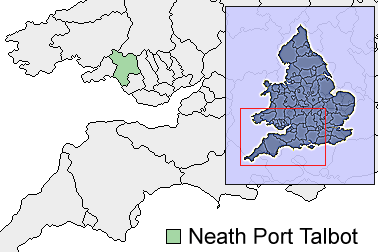Council workers sacked for surfing eBay and the BBC
Exceeding acceptable levels of internet use leads to investigations and sackings at Neath Port Talbot council in South West Wales.

It has emerged that Neath Port Talbot council in Wales has investigated six cases of improper internet use, leading to the dismissal and resignation of staff.
Two members of staff have been dismissed, while three have resigned and two are currently under investigation for what, according to local union officials, amounts in some cases to short periods of surfing non-work related sites such as auction site eBay.
The council's head of strategic personnel, Graham Jones confirmed the council has taken steps to investigate and discipline six members for what he said was "due to the significant amount of time officers were spending on the internet, and this highlighted an unacceptable level of usage of shopping, entertainment and BBC/Sky-related websites".
"We operate a shift system here, so council staff can access the internet for personal use before they clock on or after they clock off. But for those using the internet for a minute or two during their working day, nothing would happen except maybe having a quite word with them about it," he said. "We've taken this position in only the most serious cases" added Jones.
Andrew Woodward, the regional organiser for Unison Wales who represents some of the affected employees, told IT PRO that it would be lodging appeals with the council on behalf of affected members and taking it further, to tribunal, if necessary.
Woodward said the actions of the council set a dangerous precedent: "We feel they have been unfairly treated by what are draconian measures taken by the council," he said. "In some case usage of as little as 30 seconds a day has been deemed unacceptable."
He said the technology exists for the council to restrict and control access to sites other that those it already deems unacceptable for employees to visit during work outside of those it already blocks, including pornographic sites. And he said clearer acceptable use policies should have been more clearly communicated, with dismissal used as the last resort.
Get the ITPro. daily newsletter
Receive our latest news, industry updates, featured resources and more. Sign up today to receive our FREE report on AI cyber crime & security - newly updated for 2024.
"This is an indefensible policy as far as the union is concerned," Woodward said. "We not advocating banning access, but a balance must be struck where the equivalent of the conversation over the water cooler is seen as unacceptable."
Responding to the reports, security firm Sophos said web access should be controlled during work hours before employees become addicted. It warned that organisations should make sure employees are aware of what are acceptable levels of use.
Carole Theriault, senior security consultant at Sophos said: "Firms must nip the problem in the bud before it can escalate into the kind of situation Neath Port Talbot council is currently experiencing. It's simple to block access to non-essential websites, and certainly a lot less embarrassing than having to sack or discipline staff."
The council is now putting measures in place to control what access staff have to the internet.
"We now have a plan in place that will see us install [internet monitoring and access control software from] SurfControl to allow staff to access sites that they may have a personal interest in, like those for sports, travel, dating or shopping, before or after working hours" said Jones. "It will also give us the ability to allow access to sites on a case-by-case basis, where for example, a staff member dealing with gambling regulation could access gambling sites."
"For us it's a matter of getting the balance right between those few staff who abuse their access to the internet for personal use and the vast majority who do not."
A 25-year veteran enterprise technology expert, Miya Knights applies her deep understanding of technology gained through her journalism career to both her role as a consultant and as director at Retail Technology Magazine, which she helped shape over the past 17 years. Miya was educated at Oxford University, earning a master’s degree in English.
Her role as a journalist has seen her write for many of the leading technology publishers in the UK such as ITPro, TechWeekEurope, CIO UK, Computer Weekly, and also a number of national newspapers including The Times, Independent, and Financial Times.





